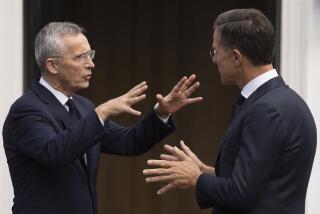Republics to Take Up Troop Issue : Military: Defense minister summons representatives for talks on ‘stationing, reduction and withdrawal’ of forces.
- Share via
MOSCOW — The new Soviet defense minister said Thursday that he will meet with representatives of all republics to discuss the future of Soviet troops on their territory.
Gen. Yevgeny I. Shaposhnikov also told a news conference that the country’s nuclear weapons are under secure control. And he reiterated that even during last month’s coup, the controls of the Soviet Union’s atomic arsenal were in safe hands.
Shaposhnikov said representatives of all republics will come to Moscow “for talks on the stationing, reduction and withdrawal (of troops) if such issues arise.”
Shaposhnikov pledged to end Soviet army interference in the internal affairs of the republics but stressed that there will be a single army in the new union. He said all nuclear weapons will remain under central command.
As part of their moves toward independence, the three Baltic republics of Estonia, Latvia, and Lithuania have demanded that Soviet troops leave their territory.
Other republics, such as the Ukraine and Byelorussia, have announced that they plan to form their own armies, and most of the republics want to set up some kind of national guard.
Meanwhile, arms negotiators from East and West met Thursday in Vienna, facing the question of how their Conventional Forces in Europe treaty can survive the changes in the Soviet Union.
The 22-nation CFE treaty, signed last November in Paris and widely seen as the cornerstone of a post-Cold War era, provides for deep cuts in military hardware from the Atlantic to the Ural Mountains.
But the Soviet Union, which agreed to the arms cuts and was to begin talks on reducing troop levels in a follow-up stage this week, is being transformed after last month’s failed coup against President Mikhail S. Gorbachev.
“It is obvious that developments in the Soviet Union that have already led to the emergence of new state forms will not fail to have their repercussions on our negotiations,” German Ambassador Ruediger Hartmann told Thursday’s meeting.
Hartmann, however, stressed that the CFE treaty “now seems to be more important than ever for safeguarding European stability” and urged that it be ratified as it stands.
Hartmann noted that the Soviet president and leaders of the republics have undertaken to abide by all arms-control agreements entered into by Moscow.
“We don’t want to change the negotiated (arms) levels, although there could be changes at a later stage,” a German diplomatic source said. “Legally the treaty cannot be altered until it has been ratified.
A German source described the Soviet delegation, led by Ambassador Oleg Grinevsky, as “very positive,” adding: “We’re doing business with them.”
More to Read
Sign up for Essential California
The most important California stories and recommendations in your inbox every morning.
You may occasionally receive promotional content from the Los Angeles Times.













